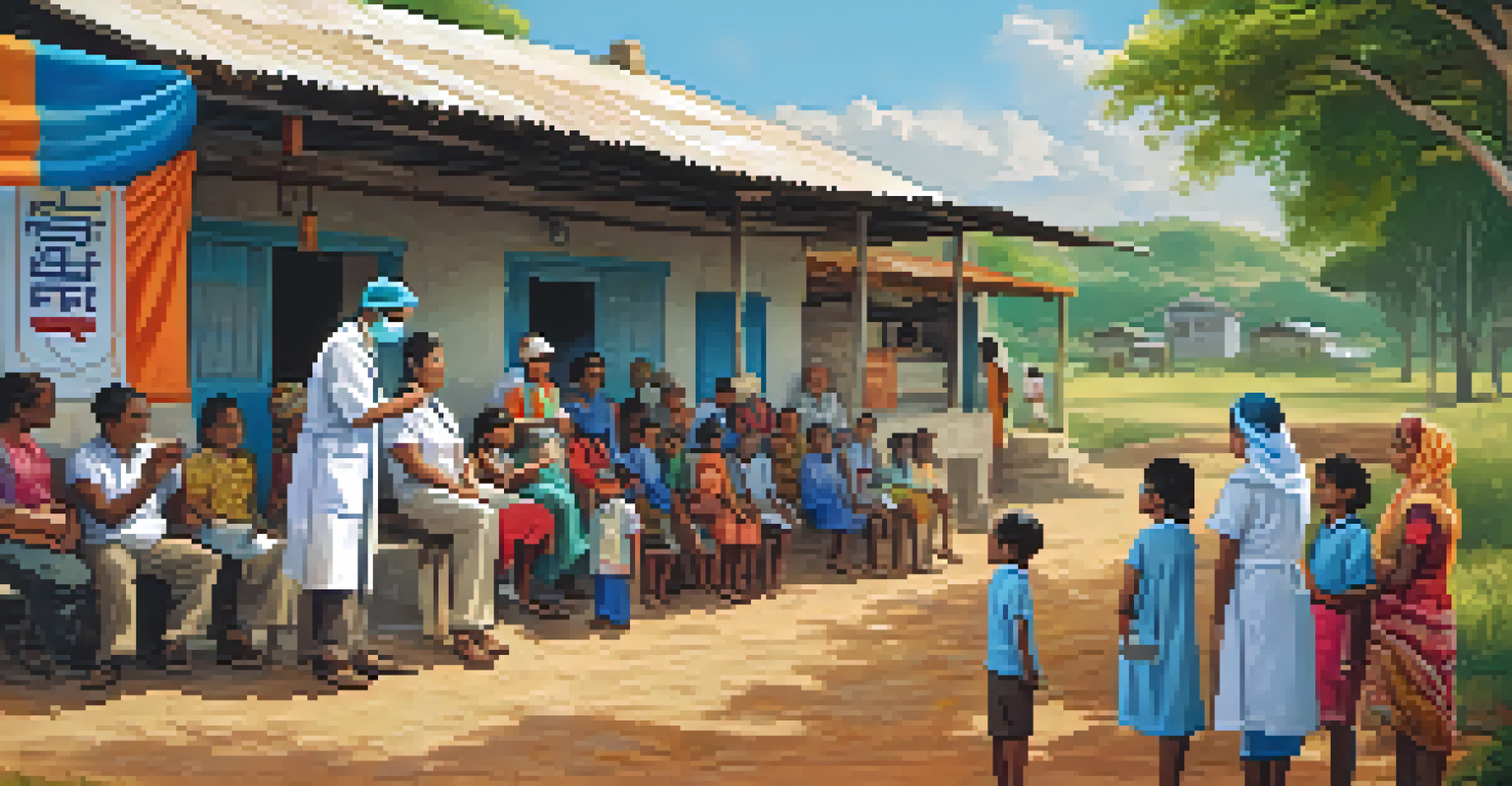Vaccination and Global Health Diplomacy: A Strategic Approach

Understanding Vaccination in Global Health Context
Vaccination plays a critical role in protecting public health worldwide. It helps to prevent outbreaks of infectious diseases, safeguarding not just individuals but entire communities. The global effort to vaccinate against diseases like measles, polio, and more recently COVID-19 showcases the importance of vaccines in reducing illness and mortality.
Vaccines are the most effective way to prevent diseases and protect our communities.
Moreover, vaccination serves as a bridge between nations, highlighting the interconnectedness of global health. When one country successfully vaccinates its population, it reduces the risk of disease spread to neighboring countries. This collective approach fosters a sense of responsibility and cooperation among nations, as health security becomes a shared goal.
In this context, health diplomacy emerges as a strategic tool, enabling countries to negotiate and collaborate on vaccination initiatives. Through diplomatic channels, nations can share resources, knowledge, and technology, ensuring equitable access to vaccines, especially in low- and middle-income countries.
The Role of Global Organizations in Vaccination Diplomacy
Global organizations like the World Health Organization (WHO) and Gavi, the Vaccine Alliance, are pivotal in vaccination diplomacy. They facilitate international agreements and partnerships aimed at improving vaccine coverage worldwide. These organizations provide technical support, funding, and a platform for countries to collaborate on immunization efforts.

For instance, initiatives like COVAX, which aims to ensure equitable access to COVID-19 vaccines, illustrate how global organizations can mobilize resources and expertise. COVAX brings together governments, manufacturers, and other stakeholders to ensure that vaccines reach those who need them most, regardless of their economic status.
Vaccination: A Global Responsibility
Vaccination not only protects individuals but also fosters international cooperation and health security.
Through their efforts, these organizations not only promote health but also strengthen diplomatic ties. When countries work together on vaccination programs, they build trust and foster relationships that can lead to broader cooperation in other areas, such as trade and security.
Challenges in Global Vaccination Efforts
Despite the importance of vaccination in global health diplomacy, challenges remain. Vaccine hesitancy, fueled by misinformation and distrust, can hinder efforts to achieve widespread immunization. Social media has amplified these concerns, making it crucial for health authorities to communicate effectively and address public fears.
In an interconnected world, no one is safe until everyone is safe.
Additionally, logistical issues such as supply chain disruptions and inequities in vaccine distribution can impede progress. For instance, during the COVID-19 pandemic, many low-income countries faced significant delays in receiving vaccines, highlighting the need for a more equitable global health framework.
These challenges underscore the need for enhanced collaboration and resource allocation. By identifying and addressing barriers to vaccination, countries can work together to ensure that all populations have access to life-saving immunizations.
The Impact of Geopolitical Factors on Vaccination
Geopolitical factors significantly influence vaccination strategies and initiatives. Political relationships between countries can determine how vaccines are shared, with some nations prioritizing bilateral agreements over global collaboration. This can lead to disparities in vaccine access, especially in regions where political tensions exist.
For example, during the pandemic, there were instances where vaccine supplies were hoarded by wealthier nations, leaving poorer countries at a disadvantage. Such actions can strain international relations and undermine global health diplomacy efforts aimed at combating infectious diseases.
Global Organizations Facilitate Access
Organizations like WHO and Gavi play a crucial role in ensuring equitable vaccine distribution through diplomacy and partnerships.
To counteract these geopolitical challenges, nations must prioritize global solidarity and recognize the mutual benefits of vaccination. By fostering an environment of collaboration and support, countries can enhance their diplomatic relations while promoting global health security.
Cultural Considerations in Vaccine Acceptance
Cultural beliefs and practices play a significant role in vaccine acceptance and uptake. Understanding local customs and traditions is essential for health diplomats to create effective vaccination campaigns. Tailoring messages to resonate with specific cultural contexts can increase trust and participation in immunization programs.
For instance, in some communities, traditional leaders or influencers are key to encouraging vaccination. By engaging these figures, health authorities can address concerns and provide accurate information, thereby increasing vaccine acceptance. This culturally sensitive approach fosters collaboration between health officials and communities.
Ultimately, recognizing and respecting cultural dynamics is crucial for successful vaccination diplomacy. As countries navigate the complexities of global health, they must prioritize cultural competence to ensure that immunization efforts are inclusive and effective.
The Future of Vaccination and Global Health Diplomacy
As we look to the future, the role of vaccination in global health diplomacy will only grow more critical. Emerging infectious diseases and ongoing public health threats underscore the need for robust vaccination strategies. Countries must work together to anticipate and respond to these challenges, leveraging diplomacy to strengthen global health systems.
Innovations in vaccine technology, such as mRNA vaccines, present new opportunities for rapid response. Collaborative research and development can lead to more effective and accessible vaccines, promoting a proactive approach to global health challenges. This requires sustained investment in international partnerships and innovation.
Cultural Sensitivity Boosts Acceptance
Understanding and respecting cultural beliefs is vital for increasing vaccine uptake and building trust in immunization programs.
In this evolving landscape, health diplomacy will be essential in fostering collaboration and ensuring equitable access to vaccines. By prioritizing vaccination in diplomatic discussions, nations can build a healthier, more resilient world for future generations.
Conclusion: The Interplay of Vaccination and Diplomacy
In conclusion, vaccination is not just a public health issue; it is a vital component of global health diplomacy. The interplay between vaccination efforts and diplomatic relations underscores the importance of collaboration and mutual support among nations. As we face ongoing and emerging health challenges, a united approach to vaccination will be crucial.
By addressing challenges such as vaccine hesitancy, geopolitical tensions, and cultural barriers, countries can enhance their diplomatic ties while promoting health equity. The lessons learned during the COVID-19 pandemic have highlighted the need for a more coordinated global response to health crises.

Moving forward, prioritizing vaccination in diplomatic efforts will not only protect populations but also foster a spirit of cooperation and solidarity. Together, nations can build a healthier future for all, demonstrating that global health diplomacy can truly be a powerful force for positive change.